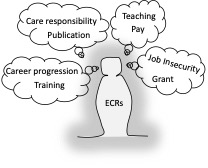This week’s post is from Dr Alexander MARTIN, Dr Marie-Louise MONAGHAN and Dr Marlène MAGALHAES PINTO – the research staff who co-presented with Paddy Hadoke, Caroline Proctor and I at Senate on October 2nd. I didn’t want to edit their views, but they’ve kindly allowed me to add a couple of notes at the end.
Being an early career researcher (ECR) is challenging. But the challenge begins even before the work does! No-one seems to agree on who an ECR is* (postdocs, teaching fellows, what about freshly minted permanent staff?). From our perspective, the thing that unites ECRs is 1) their qualifications (they have already obtained a PhD) and 2) their goals* (they want to obtain a permanent position in academia, but they do not yet have one). ECRs are employed on a wide variety of contracts, and institutions (including Edinburgh) don’t have a way of uniformly targeting ECRs. Add to this the fact that we are employed on temporary contracts and can’t tell you what country we’ll be living in a year from now, and we have quite the recipe for disaster!
Grassroots efforts like Postdoc Societies have sprung up to fill the support gap at institutions who have jumped on the ECR hiring bandwagon without establishing the administrative structures necessary to support a large group of staff members. Groups form and organise organically to encourage solidarity and to represent ECRs administratively. However, institutions provide little or no support* for such efforts, which means ECR Societies are faced with a lack of continuity. Most people who participate in them leave (we’re on temporary contracts after all) or simply give up (why spend what little time we have here improving the situation of a place we’re leaving?). But these societies are important and provide a friendly, supportive face for precarious, stressed out, and overworked community members. It’s in everyone’s interest to support these efforts.
Without the support of the administration, keeping a dynamic society is hard, and leaving such efforts to fizzle out risks the loss of a communication hub for a community that is already hard to target. Most postdocs genuinely love their research and that is what motivates us to stay in academia. But too often postdocs complain that this career path is lacking recognition, lacking options (not everybody necessarily wants to be a PI) and lacking job security.
ECR societies can join forces across campuses to be the voice of those who are too tired to have to stretch their “35h/week contract by doing teaching for free because it will be good for your CV”. What would be good for our CVs would be to do what we love (and are good at!) with less fear, more career options, and more recognition. The first step is to support ECR societies so that ECRs can advocate for themselves within institutions to foster the development of a mature scientific community that builds, works, and researches together.
Dr Alexander MARTIN
Dr Marie-Louise MONAGHAN
Dr Marlène MAGALHAES PINTO
ECR label The ECR label is a particularly confusing one as it is used by different groups and organisations to describe different career stages. At IAD we use the term “research staff” to describe staff who are employed on research contacts for a fixed term. In REF terms, ECRs is used to described staff who are independent and eligible to be included but at the start of their academic careers. A number of funded programmes describe ECRs as PhDs and those in their first postdoctoral contract. The Concordat doesn’t define what “researchers” are, leaving this to the institutions that employ them. Part of our response will be making these decisions. [back to top]
Career choice I’m using my editorial position to disagree with this point! I don’t think that aspiring for an academic position is a goal shared by all our research staff. My experience at Edinburgh and for many years before (which included time as a careers consultant for research staff) is that many people want to continue doing research but have no interest in progressing to an academic position. I also met a fair number who moved from a PhD to postdoctoral staff contracts because they didn’t know what they wanted to do… Here the Concordat is much clearer: “This Concordat recognises explicitly that, whilst talented researchers are vital for our universities and research institutes, the majority will move on and apply their skills in highly-valued careers across a wide range of employment sectors.” One of the opportunities of the Concordat is for us to strengthen this message and to help research staff transition into any number of new careers.[back to tip]
Society Support Finally, we have tried to support research societies but found it difficult to reach them. Next month we’ll be running the latest of our “Research Staff Society Networking Breakfasts” [https://www.events.ed.ac.uk/index.cfm?event=book&scheduleID=37583]. If you are part of a society, or want to start one PLEASE COME. We’ll be talking about the Concordat but also the support available from the IAD. This includes our “Research Staff Society” online resource.[back to top]


